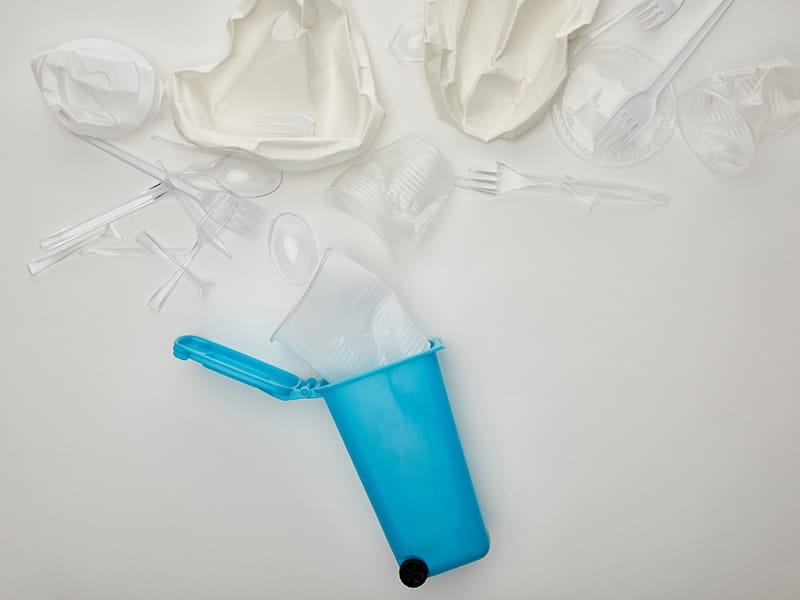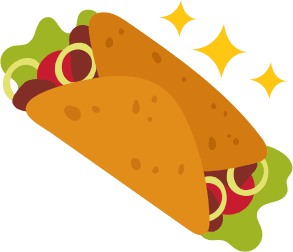Over the past few years, meal kits have shaken up the food industry. Saving people time, teaching others how to cook, and helping anyone stick to a healthy diet are some of the key benefits to using them.
Though convenience is a major draw, some consumers are concerned about the sustainability of the meal kit model and its impact on the environment.
How much waste do they create? Are they actually bad for the environment? Which boxes are the most sustainable?
Today we’re answering all of those questions and more. Read on the learn the truth about the eco-friendliness of meal kits…
Are Meal Kits Bad for the Environment?
Meal kits are typically delivered to subscribers on a weekly basis. Most kits consist of a cardboard box filled with some type of insulation with food ingredients packaged by meal or with pre-made meals ready for heating. The outer packaging is almost always cardboard and the inner packaging is typically paper, plastic, or cardboard with some kind of cooling element (such as ice packs or dry ice) to keep the food fresh until it can be refrigerated.
By the time you unpack your meal kit box, you may look at the accumulation of packaging and ask yourself the environmental impact of it all. You may be surprised to learn, however, that meal kits are actually a much more sustainable option than traditional grocery shopping.
Stunned to hear this? I was too. Let’s dig into the research to find out why…
According to a recent study published in the scientific journal Resources, Conservation and Recycling, the life cycle of a meal kit produces 33% less greenhouse gas emissions that the grocery store equivalent. The 2019 study measured the total environmental impact of five meals ordered from major meal kit company Blue Apron compared to the equivalent meal made with traditional methods. In addition to buying the ingredients and preparing the meals, researchers measured all of the packaging materials and the resulting waste from both versions of each meal.
The primary difference between the Blue Apron meals and the grocery store equivalent was the amount of food waste. For most meal kits like Blue Apron, the consumer receives only the amount required to prepare the meal. Store meals, on the other hand, may require consumers to purchase more than they need, and the leftovers may eventually be wasted.
In addition to food waste, the study examined plastic waste. It was revealed that the meal kit used more plastic than grocery store meals. However, the total greenhouse gas emissions tied to distribution were lower for the meal kits, due primarily to the streamlined chain supply. Grocery stores have trouble predicting demand and often purchase more than they can sell. This leaves the grocery stores with no choice but to regularly throw away massive quantities of spoiled food. Meal kits don’t need to predict how much food to purchase for meals since they only create meal kits based existing subscribers.
All aspects of the food acquisition, creation, packaging, and selling processes are measured as a whole, meal kits have a smaller carbon footprint than store meals.
While all of that is nice to hear, when it comes to recycling and issues of overall sustainability, not all meal kit companies are created equal. Read on to learn what issues affect the sustainability of a meal kit and which companies are the eco-friendliest.
What to Look for in an Eco-Friendly Meal Kit
There are more meal kits available today than there ever were before and each one offers its own unique qualities that sets it apart from its competitors. While factors such as pricing, variation, and customization are important to consider, you may also want to consider how eco-friendly the meal kit is in terms of everything from how recyclable they are to where they source their ingredients from.
Here are some of the most important things to look for in an eco-friendly meal kit:
- All-natural ingredients sustainably sourced, ideally organic and/or non-GMO
- Source ingredients from farms that use sustainable crop rotation and water efficiency
- Cardboard boxes made from recycled content and/or recyclable
- Insulation made from recycled, reclaimed, or plant-based materials (such as reclaimed denim or jute insulation)
- Packaging that uses compostable or biodegradable materials
- Paper bags made from post-consumer recycled paper or recyclable materials
- Plastic materials that can be reused or recycled (polypropylene #5 and low-density polyethylene plastic #4 can be recycled)
- Ice packs filled with water or soluble non-toxic gel, which can be reused or drained into the garbage and plastic film recycled
One of the key packaging materials to avoid is polystyrene foam, what many people refer to as “Styrofoam” (including those small packing peanuts). This because polystyrene foam takes hundreds of years to break down, which leads them to take over landfills. More scary though, they break apart easily and are mistaken for food by animals, who can get sick eating it.
When shopping around for a meal kit company, it is just as important to consider the ways the company benefits the environment as the ways it doesn’t. Consider all of the above but also consider which meal kits go above and beyond, not just meet the status quo. For example, Sun Basket, in addition to checking off many of the above points, makes sustainability a priority by giving back to communities through Feeding America and local food banks.
If you can’t determine the company’s commitment to sustainability on your own, check the FAQ section on the website or contact the company directly.
The Most Sustainable Meal Kits
When it comes to choosing a meal kit company, you need to consider the specific requirements and preferences of yourself and your family first and foremost. Unfortunately, it won’t do you any good to choose an eco-friendly meal kit if the meals don’t adhere to your dietary requirements.
That being said, there are a variety of sustainable and eco-friendly meal out there. Below are our favorites...
Sun Basket — Best Eco-Friendly Meal Kit For People That Love To Cook

If you’re looking for a healthy meal kit company that allows you to choose from a wide selection of specialty diets, Sun Basket is one of our favorites. Choose from meals for up to 4 people and enjoy dinners made with USDA organic produce and other clean ingredients. In addition to using USDA organic and non-GMO ingredients, Sun Basket is completely transparent about where their ingredients come from and they use completely recyclable packaging materials. Their insulation is made from reclaimed denim and their ice packs are recyclable. What we love most about Sun Basket is that they give back to the community.
Green Chef — Best Eco-Friendly Meal Kit With A Lot Of Food Variety

With a name like Green Chef, you would assume this company to be very environmentally friendly (and you would be right). Green Chef is another overall favorite meal kit of ours that offers affordably priced meals made from premium ingredients that can be prepared in 30 minutes or less. All of their ingredients are USDA certified organic, plus they are non-GMO, sustainable, and traceable. Green Chef’s packaging materials are made from reusable, recyclable, and/or compostable material when possible. Their ice packs are filled with non-toxic gel and the outer plastic layer can be recycled. What we love most about Green Chef is that they partner with Plastic Back, a company that works with businesses to collect and recycle plastic in an amount that is equal to what was used to produce a product. In addition, they're a part of the Sustainable Packaging Coalition.
Purple Carrot — Best Eco-Friendly Meal Kit For Vegans and Vegetarians

This meal kit company only offers vegan meals and this fact alone makes it a good environmental choice. This is because cattle grazing creates an incredible amount of methane and carbon dioxide, which are both greenhouse gases that contribute to climate change. All of their packaging material is recycled and/or biodegradable and they provide their customers with information about how to reuse packaging materials on their own. The only downside is their freezer packs which are not recyclable, though they can be reused.
Freshly — Best Eco-Friendly Meal Kit For People Looking To Cut Down Of Single-Use Plastics

In contrast to traditional meal kit companies, Freshly delivers meals that have already been cooked (but never frozen). You simply heat them up when you’re ready to eat. Each meal is portioned for one person and you can choose to receive up to 12 meals per week. Being pre-cooked allows Freshly to massively cut down on single-use plastics compared to other meal kits. To keep their meals fresh, Freshly uses special modified atmospheric packaging which allows them to withstand 60 hours of travel and delivery time without the use of preservatives. Their insulation is made from recycled denim and their ice packs are non-toxic. All boxes, plastic meal contains, and cardboard sleeves are recyclable. Also, we love that Freshly, like Sun Basket, partners with Feeding America to give back to the community.
Hello Fresh

If you’re looking for a meal kit company that offers a great deal of variety, Hello Fresh is a great option. Chef-crated meals are priced from $7.49 each, made with high-quality ingredients sourced straight from the farm. The cardboard box in which Hello Fresh meal kits are delivered is made from a blend of recycled and virgin fibers, though the kit bags and separators are completely recyclable and compostable. For insulation, Hello Fresh uses ClimaCell insulation which is a bio-based foam, corrugated liners, and gel ice packs. Metallic bubble liners are not recyclable, and ice pack gel should be discarded. They work to source all of their ingredients locally, which lowers CO2 emissions. And, like Green Chef (which Hello Fresh owns), they are also part of the Sustainable Packaging Coalition.
Blue Apron — Best Eco-Friendly Meal Kit Packaging

One of the first meal kit companies to enter the U.S. market, Blue Apron uses premium ingredients and chef-designed recipes for a variety of health-conscious meals. Their menu is constantly rotating, enabling customers to choose from a mix of vegetarian and meat-based options as well as Mediterranean, Weight Watchers approved, and diabetes friendly recipes. Blue Apron uses responsibly sourced ingredients (including sustainable seafood) and most of their packaging can be recycled. The only non-recyclable or reusable materials include metallic bubble insulation, lidding film, and spice sachets. Like Green Chef and Hello Fresh, Blue Apron is a part of the Sustainable Packaging Coalition. In fact, they won the 2019 Innovation in Design Optimization Award for creating packaging that: uses recyclable materials, optimizing box and ice pack materials based on the season, implementing a drain safe ice pack, designing a unique compostable tray, and being the first meal kit company to join the How2Recycle® program.
Final Thoughts
With over one hundred meal kit companies in the United States alone, it can be difficult to make a choice, especially when taking into consideration the environmental impact each has. It all comes down to determining what you're looking for in a meal kit, food-wise, and picking the meal kit that has the most sustainable option.
If you're not happy about the sustainability of the meal kit you want to go with — let them know to step it up! Voice your opinion to their customer support or on social media. Unfortunately, many won't make a positive environmental change unless they know customers would purchase once they do.
If you want to learn more about how to recycle your meal kit, we have another in-depth article here.











